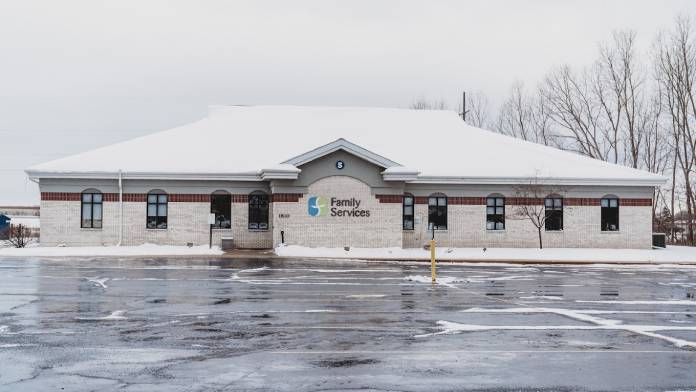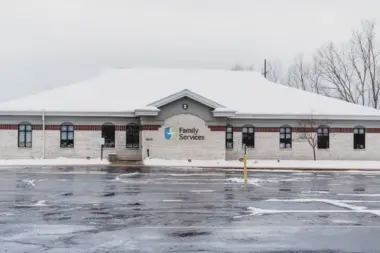About Family Services – Counseling Clinic
Menasha Counseling Clinic offers outpatient mental therapy to children, adolescents and adults across Wisconsin’s Calumet and Winnebago Counties. Located on Appleton Road just east of downtown Menasha, the clinic sits less than a mile south of the Friendship State Trail and the historic George Sr. and Ellen Banta House. It’s one of several convenient outpatient clinics operated by Family Services, a longstanding behavioral health provider that has supported residents of Northeast Wisconsin for over 120 years.
Through therapeutic support, prevention, intervention and advocacy, they work to build healthier communities where every individual is empowered to reach their fullest potential. Rooted in Family Services’ tradition of excellence and trusted care, Menasha Counseling Clinic expands on that legacy with support tailored to local needs.
Broad-Based Community-Focused Care
Backed by strong clinical expertise and a welcoming approach, the team at Menasha Counseling Clinic is committed to helping every individual feel seen, heard and empowered to heal. Their strong background in trauma therapy equips them to help clients overcome a wide range of mental, emotional and behavioral challenges.
These include common issues like depression, anxiety, mood disorders and anger challenges that can disrupt daily life and relationships. They provide trauma-focused care for sexual abuse survivors and targeted support for PTSD victims including veterans.
Specialized attention is particularly given to veterans, acknowledging the unique psychological and emotional burdens that often stem from military service. They also offer couples and family therapy often to rebuild trust, improve communication and strengthen relationships strained by emotional or behavioral challenges.
Targeted and evidence-based therapeutic support are available for individuals and families navigating substance use challenges. The clinic also offers specialized services for children as young as five and school-based support for teens and adolescents.
Flexible and Affordable Mental Health Care
Menasha Counseling Clinic stands tall for their flexible and affordable mental health care, which makes them a top choice for folks seeking help in this region. Most insurance plans are acceptable including Medicaid and private insurance options. This helps keep costs low and makes care more accessible to the vulnerable and medically indigent population.
In addition, the clinic offers in-person and virtual therapy options for added flexibility. Receiving therapeutic support from the comfort of your home not only enhances convenience but also eliminates transportation barriers to care and reduces stress.
Latest Reviews
Rehab Score
Gallery


Other Forms of Payment
Medicaid is a state based program that helps lower-income individuals and families pay for healthcare. Medicaid covers addiction treatment so those enrolled can use their coverage to pay for rehab. When a program accepts Medicaid the client often pays very little or nothing out of their own pocket.
Private insurance refers to any kind of healthcare coverage that isn't from the state or federal government. This includes individual and family plans offered by an employer or purchased from the Insurance Marketplace. Every plan will have different requirements and out of pocket costs so be sure to get the full details before you start treatment.
Self-pay involves paying for treatment out of your own pocket. You can use savings or credit, get a personal loan, or receive help from family and friends to fund your treatment. If you don't have insurance or your insurance plan doesn't cover a specific program, self-pay can help ensure you still get the care you need.
Financial aid can take many forms. Centers may have grants or scholarships available to clients who meet eligibility requirements. Programs that receive SAMHSA grants may have financial aid available for those who need treatment as well. Grants and scholarships can help you pai for treatment without having to repay.
Medicare is a federal program that provides health insurance for those 65 and older. It also serves people under 65 with chronic and disabling health challenges. To use Medicare for addiction treatment you need to find a program that accepts Medicare and is in network with your plan. Out of pocket costs and preauthorization requirements vary, so always check with your provider.
Military members, veterans, and eligible dependents have access to specific insurance programs that help them get the care they need. TRICARE and VA insurance can help you access low cost or no cost addiction and mental health treatment. Programs that accept military insurance often have targeted treatment focused on the unique challenges military members, veterans, and their families face.
Addiction Treatments
Levels of Care
Outpatient Programs (OP) are for those seeking mental rehab or drug rehab, but who also stay at home every night. The main difference between outpatient treatment (OP) and intensive outpatient treatment (IOP) lies in the amount of hours the patient spends at the facility. Most of the time an outpatient program is designed for someone who has completed an inpatient stay and is looking to continue their growth in recovery. Outpatient is not meant to be the starting point, it is commonly referred to as aftercare.
Treatments
Mental health rehabs focus on helping individuals recover from mental illnesses like bipolar disorder, clinical depression, anxiety disorders, schizophrenia, and more. Mental health professionals at these facilities are trained to understand and treat mental health issues, both in individual and group settings.
Programs
Adult rehab programs include therapies tailored to each client's specific needs, goals, and recovery progress. They are tailored to the specific challenges adult clients may face, including family and work pressures and commitments. From inpatient and residential treatment to various levels of outpatient services, there are many options available. Some facilities also help adults work through co-occurring conditions, like anxiety, that can accompany addiction.
Young adulthood can be an exciting, yet difficult, time of transition. Individuals in their late teens to mid-20s face unique stressors related to school, jobs, families, and social circles, which can lead to a rise in substance use. Rehab centers with dedicated young adult programs will include activities and amenities that cater to this age group, with an emphasis on specialized counseling, peer socialization, and ongoing aftercare.
Clinical Services
Cognitive Behavioral Therapy (CBT) is a therapy modality that focuses on the relationship between one's thoughts, feelings, and behaviors. It is used to establish and allow for healthy responses to thoughts and feelings (instead of unhealthy responses, like using drugs or alcohol). CBT has been proven effective for recovering addicts of all kinds, and is used to strengthen a patient's own self-awareness and ability to self-regulate. CBT allows individuals to monitor their own emotional state, become more adept at communicating with others, and manage stress without needing to engage in substance abuse.
Whether a marriage or other committed relationship, an intimate partnership is one of the most important aspects of a person's life. Drug and alcohol addiction affects both members of a couple in deep and meaningful ways, as does rehab and recovery. Couples therapy and other couples-focused treatment programs are significant parts of exploring triggers of addiction, as well as learning how to build healthy patterns to support ongoing sobriety.
Dialectical Behavior Therapy (DBT) is a modified form of Cognitive Behavioral Therapy (CBT), a treatment designed to help people understand and ultimately affect the relationship between their thoughts, feelings, and behaviors. DBT is often used for individuals who struggle with self-harm behaviors, such as self-mutilation (cutting) and suicidal thoughts, urges, or attempts. It has been proven clinically effective for those who struggle with out-of-control emotions and mental health illnesses like Borderline Personality Disorder.
Research clearly demonstrates that recovery is far more successful and sustainable when loved ones like family members participate in rehab and substance abuse treatment. Genetic factors may be at play when it comes to drug and alcohol addiction, as well as mental health issues. Family dynamics often play a critical role in addiction triggers, and if properly educated, family members can be a strong source of support when it comes to rehabilitation.
Group therapy is any therapeutic work that happens in a group (not one-on-one). There are a number of different group therapy modalities, including support groups, experiential therapy, psycho-education, and more. Group therapy involves treatment as well as processing interaction between group members.
In individual therapy, a patient meets one-on-one with a trained psychologist or counselor. Therapy is a pivotal part of effective substance abuse treatment, as it often covers root causes of addiction, including challenges faced by the patient in their social, family, and work/school life.
Trauma therapy addresses traumatic incidents from a client's past that are likely affecting their present-day experience. Trauma is often one of the primary triggers and potential causes of addiction, and can stem from child sexual abuse, domestic violence, having a parent with a mental illness, losing one or both parents at a young age, teenage or adult sexual assault, or any number of other factors. The purpose of trauma therapy is to allow a patient to process trauma and move through and past it, with the help of trained and compassionate mental health professionals.
Staff
Lois Mischler
President & CEO
Charm Der
VP, Human Resources
Bradley Klingsporn
VP & Chief Financial Officer
Tana Koss,
VP, Programs & Strategy
Michelle Pierquet-Hohner
VP, Philanthropy & Communication
Angela Steuck
VP, Programs & Strategy
Contact Information
1810 Appleton Road
Menasha, WI 54952